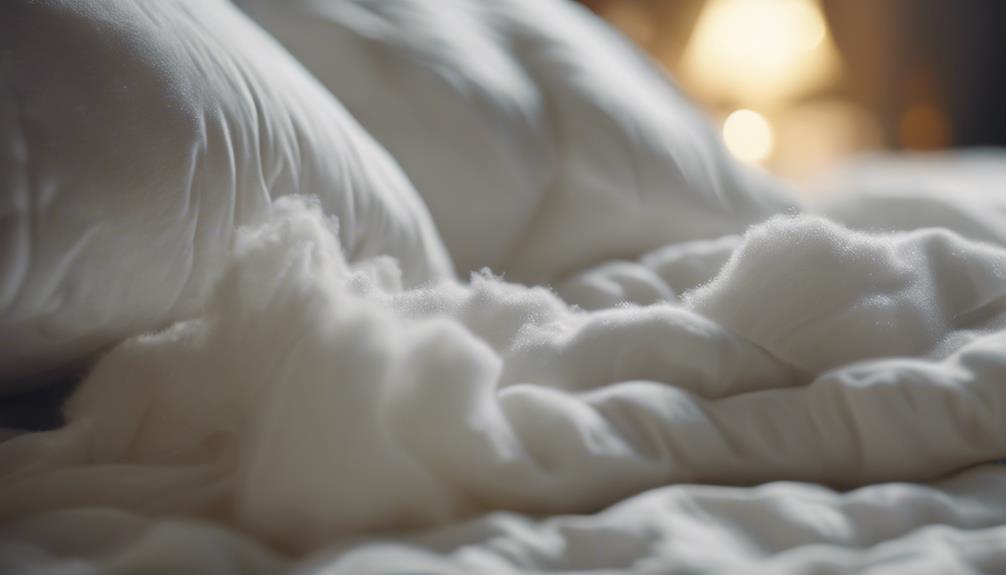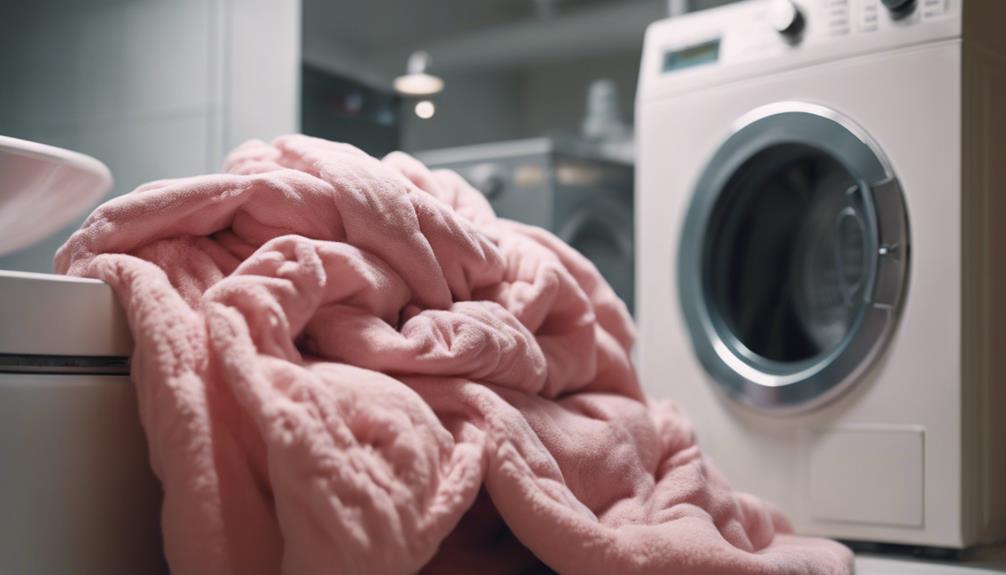Hotels often wash comforters about once a year, unless they appear visibly dirty, with variations depending on the type of hotel. Upscale establishments typically clean comforters promptly, especially if there are stains, while budget hotels may wash them less often. Prolonged periods without washing can result in hygiene issues. Factors such as capacity and cost impact the frequency of washing, leading some hotels to wash comforters sparingly. Guests may raise concerns about cleanliness, and being aware of these details can help in making informed decisions on where to stay. For those interested in the specific factors influencing hotel washing practices, there is more information to be found in the provided research.
Key Takeaways
- Hotels vary in comforter washing frequency based on type and visible stains.
- Budget hotels wash comforters less frequently than upscale hotels.
- Hygiene concerns arise from infrequent washing practices.
- Limited resources and capacity issues affect comforter washing schedules.
- Clear industry-wide standards are needed to ensure consistent cleanliness.
Frequency of Comforter Washing
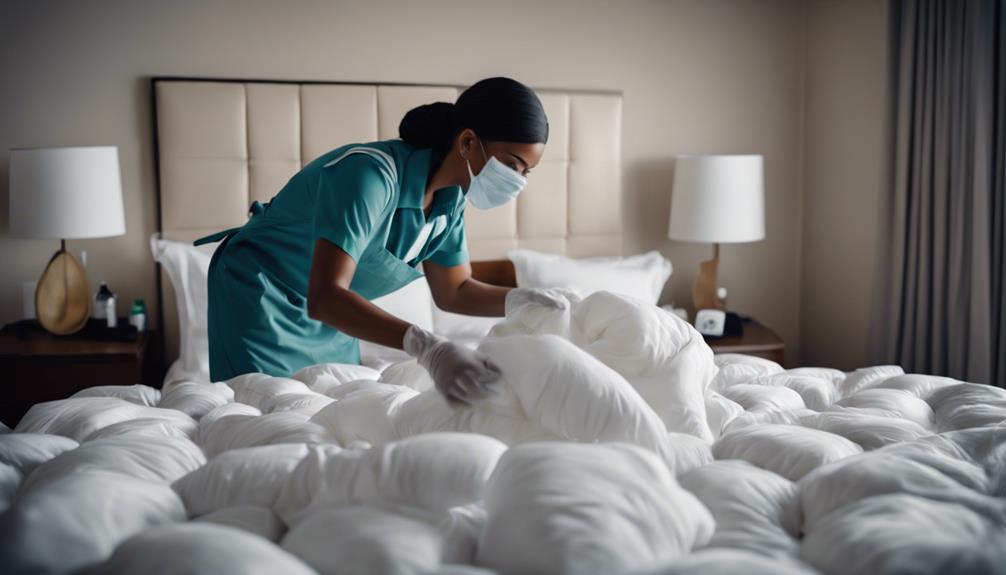
Hotels typically wash comforters once a year, unless visibly soiled. The frequency of comforter washing can vary depending on the type of hotel. Some hotels may opt to wash their comforters more frequently, such as once a month, due to capacity issues.
In contrast, upscale hotels tend to wash their comforters only if there are visible stains present, prioritizing a pristine appearance for guests. On the other hand, budget hotels and motels often wash comforters less frequently than their upscale counterparts. In some instances, lack of visible stains may lead to comforters going unwashed for extended periods in certain hotels.
It's essential for hotels to strike a balance between maintaining cleanliness standards and ensuring efficient use of resources when deciding on the frequency of washing hotel comforters. By understanding these factors, hotels can provide a comfortable and hygienic experience for their guests.
Factors Affecting Washing Frequency

Taking into account various factors affecting the washing frequency of comforters in the hospitality industry, it's essential to address the balance between cleanliness standards and resource efficiency. When it comes to hotel bedding, factors such as capacity limitations and economic considerations play a significant role in determining how often comforters are washed. Some hotel chains, including budget hotels like Days Inn and Ramada, may wash comforters infrequently, sometimes only once a year, to manage costs and operational constraints.
On the other hand, higher-end establishments like Westin prioritize cleanliness and may wash comforters based on visible stains and deep cleaning schedules. However, concerns about unwashed comforters go beyond economic factors, as they can lead to hygiene issues that directly impact the quality of a guest's stay. Finding the right balance between maintaining hygiene standards and optimizing resource efficiency is pivotal in the management of hotel bedding to ensure a pleasant and safe experience for guests.
Hygiene Concerns for Guests
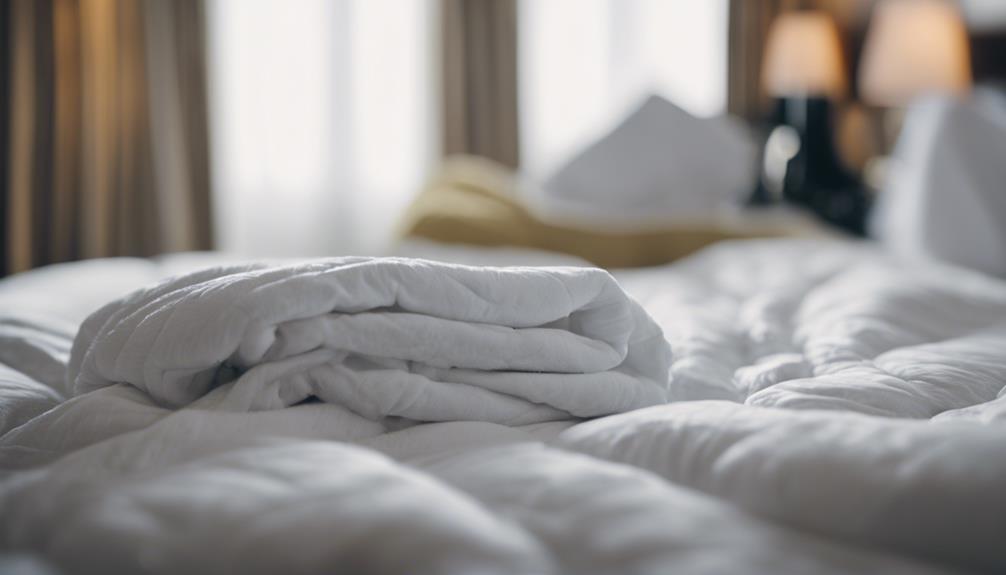
Maintaining cleanliness in hospitality establishments is crucial to guaranteeing a comfortable and safe experience for guests, particularly when it comes to the hygiene of comforters. Hotels' infrequent washing of comforters raises significant hygiene concerns. Due to limited capacity and economic factors, hotels often opt to wash comforters sparingly, which can lead to guests encountering other people's germs. This lack of regular washing is a result of traditional practices and cost considerations that many hotels adhere to.
Guests staying at hotels face potential hygiene risks when comforters aren't washed frequently. The varied practices across different hotel brands also contribute to inconsistencies in hygiene standards, ultimately impacting guest comfort. It's important for hotels to address these hygiene concerns and prioritize the cleanliness of comforters to ensure the well-being and comfort of their guests. By maintaining high standards of hygiene, hotels can enhance the overall guest experience and provide a safe environment for all visitors.
Inconsistent Practices Across Hotel Brands

Different hotel brands may have varying approaches to washing comforters. Some budget hotels wash infrequently due to staffing constraints, while others, like Holiday Inn, may go a year without washing them.
These inconsistencies in cleaning practices can impact the overall guest experience and raise concerns about hygiene standards in the hospitality industry. Customers may have differing expectations regarding cleanliness, highlighting the need for transparency and standardized practices across hotel chains.
Brand-Specific Washing Frequencies
Examining the various practices of hotel brands in washing comforters reveals significant discrepancies in hygiene standards. While some hotels prioritize cleanliness by washing comforters based on visible stains, others have concerning practices:
- Ramada hotels seldom wash their comforters, raising hygiene concerns.
- Days Inn washes comforters only once a year due to understaffing problems.
- Holiday Inn has reported not washing comforters for a year, leading to questions about cleanliness.
These inconsistent washing frequencies across hotel brands highlight the necessity for standardized hygiene practices to guarantee guest satisfaction and comfort.
Impact on Guest Experience
In our travels, we've encountered varying levels of comforter cleanliness due to inconsistent washing practices among different hotel brands. This disparity can have a notable impact on the overall guest experience, especially when it comes to feeling comfortable and relaxed in a hotel room.
Guests often have certain expectations regarding the cleanliness of their accommodations, including the comforters provided. However, with varied policies on comforter washing across hotel chains, these expectations may not always align with reality.
Hygiene concerns can arise when hotels don't wash comforters regularly, highlighting discrepancies in hygiene standards among establishments. Factors such as hotel capacity limitations and economic considerations can contribute to these infrequent washing practices, ultimately affecting the quality of a guest's stay in a hotel.
Impact of Capacity Issues on Washing
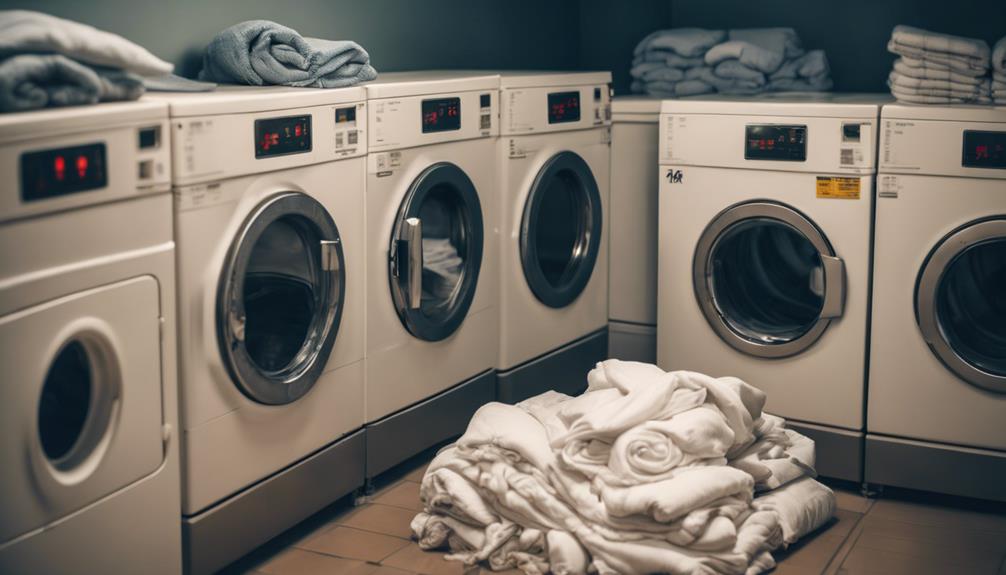
Due to capacity issues in hotels, the frequency of washing comforters is often compromised. This can have significant implications for the cleanliness and overall guest experience. Here are some key points to take into account:
- Limited resources and time constraints play a significant role in the infrequent washing of comforters.
- High occupancy rates and continuous guest turnovers make it challenging for hotels to wash comforters regularly.
- Understaffing can lead to delays in comforter washing schedules, affecting the cleanliness of bedding.
These factors combined create a scenario where hotels may struggle to maintain the desired level of cleanliness in their comforters.
It's essential for both hotel management and guests to be aware of these challenges and work together towards finding solutions that prioritize hygiene and guest satisfaction.
Guest Expectations Vs. Reality

Guests often expect hotel comforters to be washed regularly to meet cleanliness standards, but the reality may not always align with their expectations.
The frequency of washing comforters varies across hotels, and this discrepancy can raise concerns about guest health and hygiene.
Understanding these differences can help manage expectations and make informed decisions when choosing accommodation.
Cleanliness Standards Met
How frequently do hotels actually wash comforters to meet cleanliness standards, considering guest expectations versus reality?
When it comes to cleanliness standards met by hotels regarding comforters, there are several key points to keep in mind:
- Guest satisfaction may be compromised when comforters aren't washed regularly, impacting their perception of the hotel's hygiene standards.
- Importance standards are vital in the hospitality industry, and the frequency of comforter washing plays a significant role in meeting these standards.
- Reality versus guest expectations regarding comforter cleanliness can lead to discrepancies that affect the overall quality of the guest experience.
Frequency of Washing
When considering the frequency of washing comforters in hotels, it becomes apparent that cleanliness standards may not always align with guest expectations. Hotels often wash the comforter or duvet cover only when visibly soiled, which may not meet the cleanliness standards guests anticipate.
Some establishments, including upscale hotels, may delay washing comforters unless there are visible stains present, potentially leading to infrequent washing. Due to capacity issues, certain hotels wash comforters as infrequently as once a year, which contrasts starkly with guests' desire for fresh linens.
Even budget hotels and motels, like Ramada and Days Inn, may not wash comforters regularly unless there are noticeable stains. This discrepancy between guest expectations and hotel practices highlights the importance of managing cleanliness perceptions effectively.
Guest Health Concerns
Concerns regarding guest health in relation to the cleanliness of comforters in hotels often stem from the discrepancy between guest expectations for regularly washed linens and the reality of infrequent cleaning practices in the hospitality industry. When it comes to the cleanliness of comforters, several key points should be considered:
- Hotels often don't wash comforters between guest stays, raising concerns about exposure to germs.
- Guest expectations for clean duvets may not align with the reality of infrequent washing practices in many hotels.
- The traditional practice of not washing comforters frequently persists in the hospitality industry, impacting guest health concerns.
Understanding these factors can help guests make informed decisions and take necessary precautions during their hotel stays.
Need for Clearer Standards

Why do hotel comforters lack consistent washing standards despite varying industry practices and guest expectations? The lack of clear guidelines on comforter washing frequency in the hospitality industry leads to inconsistencies across establishments. While some hotels adhere to higher standards by washing comforters more frequently, others may only wash them annually. This disparity can be confusing for guests who expect a certain level of cleanliness during their stay.
To address this issue, it is imperative for the industry to establish clearer standards regarding comforter washing practices. By implementing uniform guidelines, hotels can guarantee a higher level of hygiene and meet guest expectations. Below is a table highlighting the current disparities in comforter washing practices among hotels:
| Hotel Category | Frequency of Comforter Washing | Visible Stains Impact |
|---|---|---|
| Upscale Hotels | Weekly | Always washed |
| Budget Hotels | Bi-annually | Only if visible |
| Motels | Annually | Rarely washed |
Establishing industry-wide standards will not only enhance guest satisfaction but also improve overall hygiene in hotel accommodations.
Economic Considerations in Washing Practices
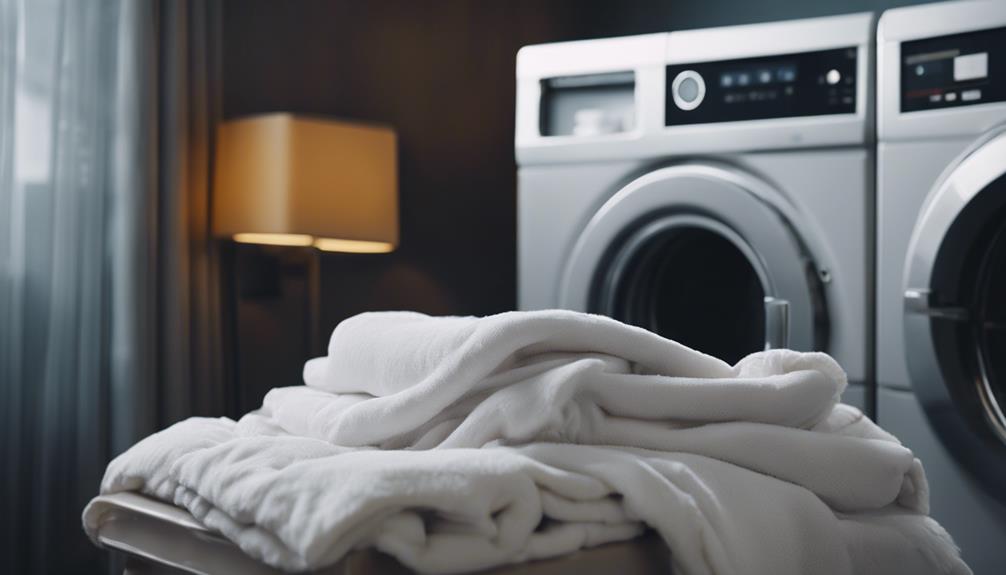
Taking into account the economic implications, hotels may opt to limit the frequency of washing comforters to save on operational costs. This decision is often influenced by budget constraints and the need for operational efficiency. Some key points to ponder in the economic aspect of washing practices include:
- Impact on Economy: Regularly washing comforters can lead to increased laundry costs, impacting the overall operational budget of hotels.
- Utility Expenses: Frequent washing of comforters can result in higher water, detergent, and energy expenses for hotels, affecting their bottom line.
- Labor Costs: The time and effort required to wash comforters frequently can also contribute to higher labor costs, further straining the hotel's financial resources.
In light of these factors, hotels may strategically balance the need for cleanliness with the economic considerations associated with washing comforters. By finding a cost-effective approach that meets hygiene standards while optimizing laundry costs, hotels can maintain a balance between guest satisfaction and financial sustainability.
Germs and Allergens in Comforters
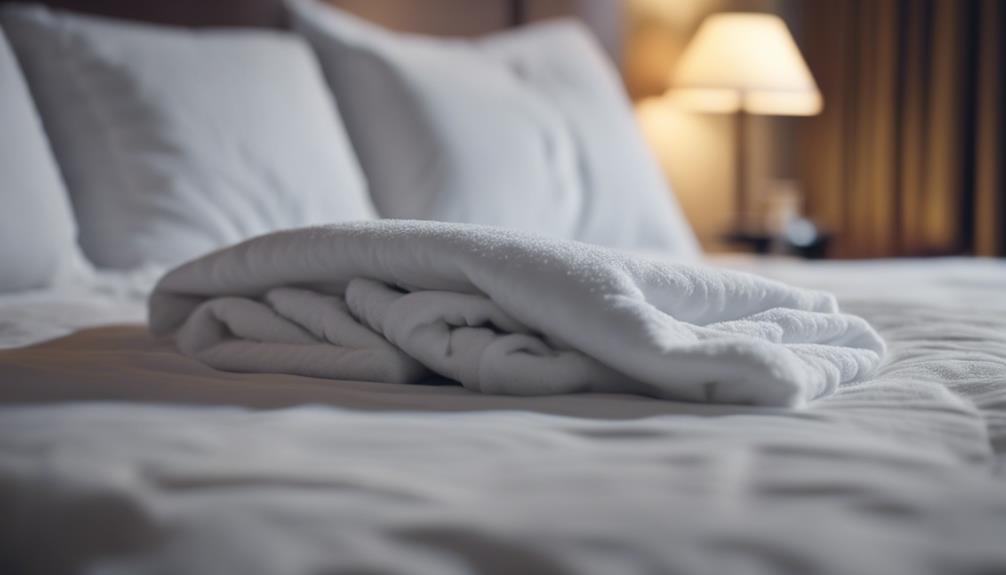
Comforters in hotels may contain germs, dust mites, and allergens if not washed regularly. Accumulated dirt and bacteria in unwashed comforters can pose health risks for guests, potentially leading to skin irritations and respiratory issues.
Proper cleaning of comforters is essential to guarantee a hygienic sleeping environment, especially for guests with allergies or sensitivities.
Germs in Comforters
Amidst multiple guests' use, germs and allergens can accumulate in unwashed comforters in hotels. When left unwashed, comforters can become breeding grounds for various harmful microorganisms, impacting the overall cleanliness and hygiene of the bedding.
Here are a few key points to take into account regarding germs in comforters:
- Dust mites: These microscopic creatures thrive in unwashed bedding, contributing to allergies and skin irritations.
- Bacteria: Unwashed comforters can harbor bacteria, potentially leading to infections or illnesses.
- Allergens: Accumulation of allergens like pet dander or pollen can exacerbate allergies in sensitive individuals.
Regular washing of comforters is essential to mitigate the risk of germs and allergens, ensuring a healthier and more comfortable stay for guests.
Allergens in Bedding
Allergens present in hotel bedding, including comforters, can exacerbate allergies and respiratory issues for sensitive individuals. Dust mites, pet dander, and pollen are common allergens that can accumulate in comforters, especially if they aren't washed regularly. These allergens can trigger allergic reactions and worsen respiratory conditions.
To minimize exposure to allergens, consider using hypoallergenic duvet covers or requesting freshly laundered comforters when staying in hotels. Regular washing of bedding, including comforters, is essential to reduce allergen buildup and improve indoor air quality. Hotels that don't wash comforters frequently may contribute to guests' exposure to these allergens.
Guests with allergies should take proactive steps to ensure a more comfortable and allergen-free stay.
Health Risks Associated
Given the potential health risks associated with unwashed hotel bedding, it's essential to address the accumulation of germs and allergens in these linens.
- Unclean comforters in hotels can harbor a variety of germs and allergens.
- Accumulated dirt and bacteria in unwashed comforters can lead to health issues for guests.
- Allergies and skin irritations can be triggered by the presence of germs and allergens in comforters.
Regular washing of comforters is vital to prevent the spread of germs and maintain a healthy environment for guests. By ensuring that comforters are cleaned regularly, hotels can reduce the risk of potential health problems and provide a more comfortable stay for their guests.
Importance of Cleanliness in Hospitality

Ensuring cleanliness in hospitality establishments is paramount to guaranteeing guest satisfaction and maintaining a safe environment. Clean comforters play an essential role in upholding these standards. Regular washing of comforters is important for maintaining cleanliness and hygiene in hotels. By keeping comforters clean, hotels can reduce the risk of allergens, germs, and unpleasant odors that may affect guests.
Infrequent washing of comforters can impact guest satisfaction and their perception of a hotel's overall cleanliness. Despite challenges such as capacity limitations and economic factors, hotels must prioritize the cleanliness of comforters to provide a safe and healthy environment for guests. Therefore, maintaining a high standard of comforter cleanliness is essential in the hospitality industry.
Hotels that consistently wash their comforters not only meet hygiene standards but also demonstrate their commitment to guest well-being and satisfaction.
Frequently Asked Questions
Do Hotels Wash the Comforter After Every Guest?
We usually don't wash comforters after every guest stay. Comforters are typically washed only if visibly stained or soiled. Factors like capacity issues make washing comforters after each guest challenging for many hotels.
The frequency of comforter washing varies across hotel brands and may not always align with guest expectations. It's essential for guests to be aware of this hotel practice regarding comforter cleanliness.
How Often Are Comforters Washed?
We wash comforters based on guidelines from the American Hotel & Lodging Association. Our cleaning frequency aligns with industry standards, ensuring a comfortable and hygienic stay for our guests.
Our commitment to cleanliness extends to all aspects of our rooms, including comforters. Rest assured, we prioritize guest satisfaction and maintain a high level of cleanliness in all our accommodations.
Your comfort and well-being are our top priorities.
What Do They Not Wash in Hotel Rooms?
In hotel rooms, we don't wash comforters regularly. Despite being used by multiple guests, comforters may go unwashed for extended periods unless visibly soiled. This practice is common in the hospitality industry due to time and cost constraints.
However, duvet covers are often laundered more frequently to maintain cleanliness. It's essential for guests to be aware of this practice and consider using their own protective bedding while staying in hotels.
Do Hotels Wash Sheets Every Night?
We don't wash sheets every night in hotels. Sheets are usually changed between guest stays for cleanliness.
Comforters, on the other hand, aren't washed as frequently as sheets. Comforters in hotel chains are typically washed four times a year, unless visibly soiled or upon guest request.
It's important to note that unlike sheets, comforters may not be changed daily during a guest's stay.
Do Hotels Dry Clean Comforters Regularly?
Hotels prioritize cleanliness to maintain a positive guest experience. This includes regular dry cleaning cost for comforters to ensure they are free of germs and allergens. By investing in the dry cleaning cost for comforter, hotels can provide a comfortable and healthy environment for their guests.
Conclusion
To summarize, the frequency at which hotels wash comforters can vary greatly based on a number of factors.
It's crucial for hotels to prioritize cleanliness and hygiene for the comfort and well-being of their guests.
By implementing clear standards and consistent washing practices, hotels can guarantee a comfortable and germ-free experience for all visitors.
Remember, a clean comforter isn't just a luxury, but a necessity for a truly relaxing stay.


